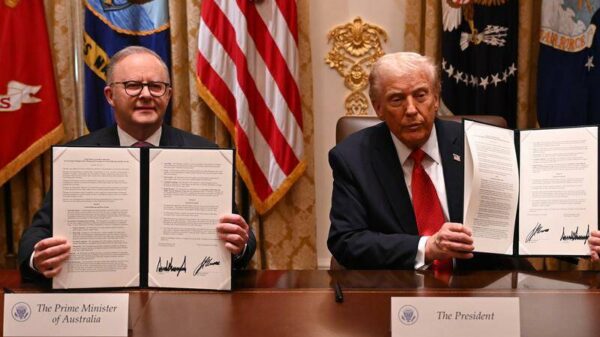The recent meeting between Australian Prime Minister Anthony Albanese and U.S. President Donald Trump has sparked debate over the effectiveness of Kevin Rudd as the Australian ambassador to the United States. Following Trump’s comments about Rudd during a joint press conference, the opposition has intensified its criticism, despite the overall success of the diplomatic encounter.
During the press conference, Trump referred to Rudd in unflattering terms, yet off-camera, Rudd reportedly received an apology from the president, who later remarked to Albanese that Rudd seemed like a “nice guy.” This contrast between public and private interactions has led many to question the sincerity and impact of Trump’s remarks. The incident, while noteworthy, appears to be overshadowed by the substantive achievements of the meeting.
The meeting covered key topics, including the AUKUS security partnership, critical minerals agreements, and discussions around defense spending. The signing of a rare earths and minerals investment agreement was particularly timely, given recent market shifts including China’s restrictions on mineral exports. Albanese and Trump navigated the meeting effectively, avoiding the awkwardness that has characterized previous encounters between Trump and foreign leaders.
Despite the positive outcomes, the opposition, particularly figures like Sussan Ley, has seized upon Rudd’s comments to divert attention from the Coalition’s internal issues. Ley’s criticisms, however, seemed out of touch with public sentiment, which largely views the meeting as a success. The focus on Rudd has been criticized as a distraction from more pressing political matters.
“Albanese has been right in keeping Rudd in Washington, and right in bringing him to the meeting. That showed strength of character – and strength and power are the only things Trump respects,”
stated former Prime Minister Malcolm Turnbull. His comments highlight the strategic importance of Rudd’s presence during the meeting.
The broader implications of the meeting suggest a strengthening of U.S.-Australia relations, especially in light of growing concerns over China’s increasing influence in the region. The successful outcomes of the meeting may provide a platform for future collaboration, as both countries navigate complex geopolitical landscapes.
As the opposition continues to grapple with the fallout from the meeting, their fixation on Rudd’s past statements may ultimately prove counterproductive. The public appears more interested in the effective handling of international relations than in past tweets or comments that have since been deleted.
Moving forward, the opposition must reconsider its strategy, focusing on issues that resonate with the electorate rather than on a sideshow that distracts from the substantive achievements of the Albanese administration. The recent diplomatic engagement serves as a reminder of the need for political parties to adapt and respond to the evolving landscape of international affairs.































































